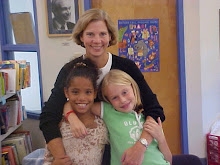Learning, like fire without oxygen, can suffocate without freedom.
In her Times Union editorial, Picturing Education on a Bell Curve, Kristin Christman bemoans the strictures placed around traditional schooling. Why does school have to be the way it is? Why can't we be more creative in how we structure school?
I have often wondered the same thing. Does the lunch room have to be a loud place lacking in civility? Why is there a rigid schedule that leaves out time for flexibility and play? I recall as a child feeling like school was a long sentence stretching far into my future. Summer was the welcomed reprieve for losing myself in a book, and during my six weeks of camp in the mountains an unbelievably free time to discover what seemed far more real and important than what happened during the school year.
As progressive school educators, we have the luxurious freedom to work with like-minded colleagues to craft a school experience that puts the children first. We can make school interesting and fun. We can eat lunch at small tables with friendly civility. We can take the afternoon for Muddy Boots Club or a week for tinkering with engines and planning how to do "good" in the world. We like to ask ourselves, how can we best capture children's hearts and minds? How can we make school the place children yearn to come?
School - and at Parker that includes summer camp - is meant for intense friendships and self-discovery, where kids can get lost in a good book, tinker, dance, experiment and play in the woods. A place where kids learn to question and think, to hold themselves to the highest standards because it matters.
Christman has it right: To thrive, children require sleep, shelter, nutrition, fresh air, nature, athletics, play, love, family, friends, stimulation, education, community, a sense of power and purpose, and freedom to pursue their passions. Of course school should be that place where children thrive!
I have often wondered the same thing. Does the lunch room have to be a loud place lacking in civility? Why is there a rigid schedule that leaves out time for flexibility and play? I recall as a child feeling like school was a long sentence stretching far into my future. Summer was the welcomed reprieve for losing myself in a book, and during my six weeks of camp in the mountains an unbelievably free time to discover what seemed far more real and important than what happened during the school year.
As progressive school educators, we have the luxurious freedom to work with like-minded colleagues to craft a school experience that puts the children first. We can make school interesting and fun. We can eat lunch at small tables with friendly civility. We can take the afternoon for Muddy Boots Club or a week for tinkering with engines and planning how to do "good" in the world. We like to ask ourselves, how can we best capture children's hearts and minds? How can we make school the place children yearn to come?
School - and at Parker that includes summer camp - is meant for intense friendships and self-discovery, where kids can get lost in a good book, tinker, dance, experiment and play in the woods. A place where kids learn to question and think, to hold themselves to the highest standards because it matters.
Christman has it right: To thrive, children require sleep, shelter, nutrition, fresh air, nature, athletics, play, love, family, friends, stimulation, education, community, a sense of power and purpose, and freedom to pursue their passions. Of course school should be that place where children thrive!


.jpg)




